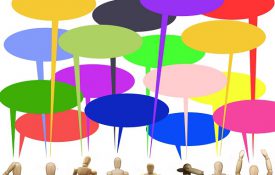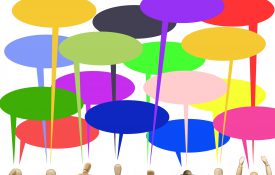-
Coronavirus: Bay Area Families Find the Silver Lining in Home Confinement
In the first week of lockdowns for a historic global pandemic, families are struggling to adjust to a new reality. Parents have to play the role of teacher, a job they have no training for. They’re also trying to manage their own anxiety, while their kids, generally pretty social creatures, are cut off from friends. ... “At the same time, the pace of our lives had become overly frenetic,” said Estrella, who is working from home for a research and evaluation firm. “The kids were feeling overwhelmed by the pace, their parents’ work lives, the requirements of school.
-

New Research From Clinical Psychological Science
A sample of research on voter perceptions of Donald Trump’s personality, depression and self-esteem, trauma exposure, digital-media use and depressive symptoms, pathological personality traits, social anxiety disorder and social interactions, and how to eat healthier.
-

APS Roundtable: Psychological Science and COVID-19, What We Know and What We Can Do
On March 18, the Association for Psychological Science convened a virtual roundtable of four APS members who discussed the psychological dimensions of COVID-19 and how it is affecting both society and individuals.
-

REDIRECT – APS Roundtable: Psychological Science and COVID-19, What We Know and What We Can Do
An virtual roundtable of experts share their views on the psychological impact of COVID-19.
-
Trump Has No Qualms About Calling Coronavirus the ‘Chinese Virus.’ That’s a Dangerous Attitude, Experts Say
A single word scrawled in black marker stood out among the prepared remarks President Trump planned to deliver during Thursday’s White House press briefing on the ongoing global coronavirus pandemic. In the president’s notes, “Corona” had been crossed out and replaced with “Chinese.” The last-minute edit was captured in photos taken by The Washington Post’s Jabin Botsford and marks the latest instance of Trump deliberately calling the novel virus a name that has been frowned upon by critics, who say its usage could lead to increased discrimination and racism toward Asian Americans — a marginalized group with a long history of being scapegoated amid public health crises. ...
-
A Trick to Stop Touching Your Face
We didn’t sign a consent form, but we’re all participants in the world’s largest natural experiment in behavior change. In response to the coronavirus pandemic, millions if not billions of people around the globe are pleading for systemic solutions. In the meantime, we’re all trying to do what we can to flatten the curve of this crisis by not getting sick. The best practices are well known: Keep your distance, wash your hands, don’t touch your face. But there’s a big difference between knowing and doing. How can we close that gap? Psychologists sometimes describe the barrier to behavior change as the conflict between wants and shoulds.

